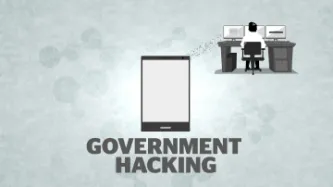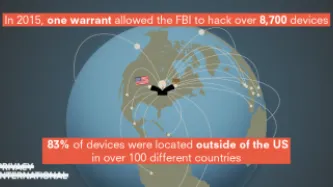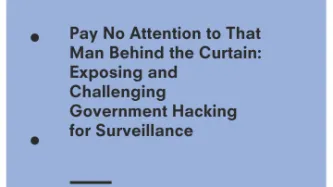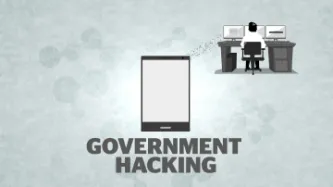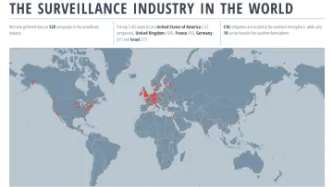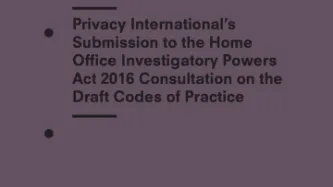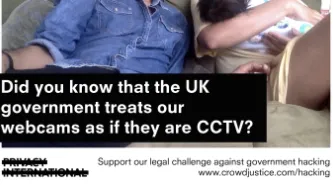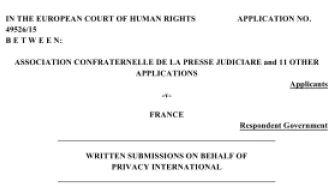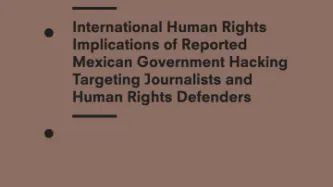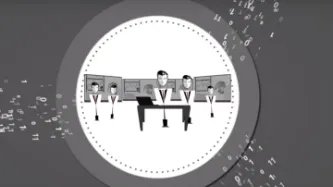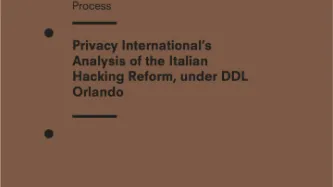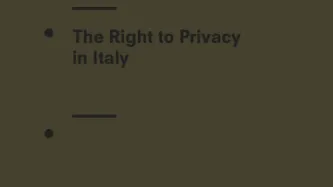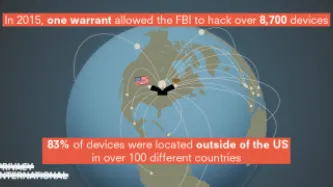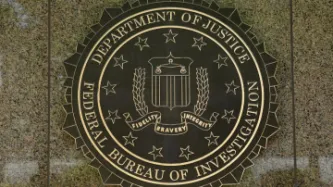Search
Content type: News & Analysis
Federal law enforcement is deploying powerful computer hacking tools to conduct domestic criminal and immigration investigations.
By Alex Betschen, Student Attorney, Civil Liberties & Transparency Clinic, University at Buffalo School of Law
Hacking by the government raises grave privacy concerns, creating surveillance possibilities that were previously the stuff of science fiction. It also poses a security risk, because hacking takes advantage of unpatched vulnerabilities in our…
Content type: Press release
FOR IMMEDIATE RELEASE
December 21, 2018
CONTACTS:
Alex Betschen, Civil Liberties & Transparency Clinic, [email protected], 716–531–6649
Colton Kells, Civil Liberties & Transparency Clinic, [email protected], 585–766–5119
Abdullah Hasan, ACLU, [email protected], 646–905–8879
NEW YORK — Privacy International, the American Civil Liberties Union, and the Civil Liberties & Transparency Clinic of the University at Buffalo School of Law filed a lawsuit today…
Content type: Impact Case Study
What HappenedOn 5 June 2013, The Guardian published the first in a series of documents disclosed by Edward Snowden, a whistleblower who had worked with the NSA. The documents revealed wide-ranging mass surveillance programs conducted by the USA’s National Security Agency (NSA) and the UK’s Government Communications Headquarters (GCHQ), which capture the communications and data of hundreds of millions of people around the world. In addition to revealing the mass surveillance programs of the NSA…
Content type: Long Read
As our four year battle against the UK government’s extraordinarily broad and intrusive hacking powers goes to the Supreme Court, we are launching a new fundraising appeal in partnership with CrowdJustice.
We are seeking to raise £5k towards our costs and need your help. If we lose, the court may order us to pay for the government’s very expensive army of lawyers. Any donation you make, large or small, will help us both pursue this important case and protect the future ability of…
Content type: News & Analysis
Privacy International notes a recent ruling issued by Italy’s Supreme Court (Corte di Cassazione) that addresses the need to limit government hacking powers for surveillance purposes and articulates required safeguards when hacking is conducted as part of a criminal investigation.
The ruling addresses the appeals of several individuals involved in a case of corruption; the appeals challenge irregularities in the collection of data as part of the criminal investigation, which resulted in the…
Content type: News & Analysis
This piece was originally published on Just Security.
Ten years ago, an FBI official impersonated an Associated Press reporter to lure and track a teenager suspected of sending in prank bomb threats to his school. To find him, the FBI agent, posing as a reporter, sent the teenager links to a supposed story he was working on, but the links were infested with malware that once clicked on quickly exposed the teen’s location. More recently, the FBI has seized and modified websites so…
Content type: Advocacy
Privacy and security are both essential to protecting individuals, including their autonomy and dignity. Undermining privacy undermines the security of individuals, their devices and the broader infrastructure. People need privacy to freely secure themselves, their information, and fully enjoy other rights.
A growing number of governments around the world are embracing hacking to facilitate their surveillance activities. When governments hack for surveillance purposes, they seek to…
Content type: Advocacy
Introduction
Why We Are So Concerned about Government Hacking for Surveillance
Scope of Our Safeguards
1. Legality
2. Security and Integrity of Systems
3. Necessity and Proportionality
4. Judicial Authorisation
5. Integrity of information
6. Notification
7. Destruction and Return of Data
8. Oversight and Transparency
9. Extraterritoriality
10. Effective Remedy
Commentary on each
1. Legality
2. Security and Integrity of Systems
3. Necessity and Proportionality
4.…
Content type: Press release
In a remarkable development in Privacy International's four year legal battle against the UK Government's powers to hack phones and computers on a massive scale, the UK Supreme Court has agreed to hear the London-based charity's case in December 2018.
Privacy International's case stems from a decision by the Investigatory Powers Tribunal (a specialised court set up to hear complaints against government surveillance, including surveillance carried out by the UK intelligence agencies) finding…
Content type: Impact Case Study
What is the problem
For over two decades we have been documenting an alarming use and spread of surveillance. It is no longer just the wars on terror or drugs or migration that is driving this trend. The management of health crises and distribution of welfare regularly are among others being used to justify this turn to increasingly invasive forms of surveillance. From country to country we see the same ideas and the same profiteers expanding their reach.
When we first released our report on…
Content type: Advocacy
On 6 March 2018, Privacy International participated in an interactive dialogue with the UN Special Rapporteur on the right to privacy at the 37th Ordinary Session of the Human Rights Council in Geneva. We highlighted the growing trend of governments embracing hacking to facilitate their surveillance activities, and recommended the development of a human rights analysis of government hacking for surveillance purposes, with the view to forming specific…
Content type: Explainer
What is the Global Surveillance Industry?
Today, a global industry consisting of hundreds of companies develops and sells surveillance technology to government agencies around the world. Together, these companies sell a wide range of systems used to identify, track, and monitor individuals and their communications for spying and policing purposes. The advanced powers available to the best equipped spy agencies in the world are being traded around the world. It is a…
Content type: Press release
Privacy International and Open Rights Group have submitted a response to the Consultation on establishing a UK Privacy and Civil Liberties Board.
Content type: Press release
On 15 March 2017, the Italian Senate voted on a Bill, put forward by Justice Minister Andrea Orlando, that will reform the criminal justice system, including amending the Code of Criminal Procedure. Among the many provisions contained in DDL Orlando, currently pending approval by the Italian House of Representatives, the Government is mandated to regulate, via a legislative decree, the utilisation of malware (commonly referred to as ‘Trojans’ in Italian discourse) to engage hacking for criminal…
Content type: Key Resources
Introduction
Why We Are So Concerned about Government Hacking for Surveillance
Scope of Our Safeguards
1. Legality
2. Security and Integrity of Systems
3. Necessity and Proportionality
4. Judicial Authorisation
5. Integrity of information
6. Notification
7. Destruction and Return of Data
8. Oversight and Transparency
9. Extraterritoriality
10. Effective Remedy
Commentary on each
1. Legality
2. Security and Integrity of Systems
3. Necessity and Proportionality
4.…
Content type: Advocacy
The powers set out in the Investigatory Powers Act are wide ranging, opaque and lacking in adequate safeguards. The Government have now published updated Draft Codes of Practice for certain parts of the Act. Unfortunately, the Codes do little to solve the Act’s problems. Instead, they add little transparency, occasionally expand powers, and undermine some of the limited safeguards in the Investigatory Powers Act. These Codes demand close scrutiny. The unusually short timeframe for…
Content type: Long Read
Government hacking is unlike any other form of existing surveillance technique. Hacking is an attempt to understand a system better than it understands itself, and then nudging it to do what the hacker wants. Fundamentally speaking, hacking is therefore about causing technologies to act in a manner the manufacturer, owner or user did not intend or did not foresee.
Governments can wield this power remotely, surreptitiously, across jurisdictions, and at scale. A single hack can affect many…
Content type: News & Analysis
The short answer is yes.
I'm sure many of you have seen people with stickers over their webcams and wondered why (probably writing that person off as paranoid). But it's well known in tech circles that a camera in a computer or smartphone can be turned on remotely by an attacker with the resources, time, and motivation.
Security is hard, and our defences are weak. The capability of an adversary to attack your devices doesn't necessarily hinge upon a consumer choice of…
Content type: Press release
On 5 October 2017, Privacy International will appear before the UK Court of Appeal to continue its challenge to the British government's large scale hacking powers. The case questions the decision by the Investigatory Powers Tribunal (IPT) to sanction the UK government's power to hack broad categories of people or property without any individualised suspicion.
TIMELINE AND KEY POINTS
- Privacy International began fighting bulk government hacking in 2014 at the…
Content type: Long Read
European Court of Human Rights Intervention
On 15 September 2017, Privacy International filed an intervention to the European Court of Human Rights in Association Confraternelle de la Presse Judiciare and 11 Other Applications v. France. This case challenges various surveillance powers authorised under the French Intelligence Act of 24 July 2015 as incompatible with Articles 8 and 10 of the European Convention on Human Rights, which respectively protect the right to privacy…
Content type: Advocacy
On 28 June 2017, Privacy International sent a letter and briefing to the Mexican government following reports indicating that Mexican authorities had used NSO Group’s Pegasus spyware to target journalists and human rights defenders working to expose government corruption and human rights abuses. NSO Group is a surveillance technology company that sells products and services, including malware, exclusively to government clients.
These attacks were designed to compromise the mobile phones of…
Content type: Press release
Please find attached a copy of the briefing along with promotional photographs with the briefing.
Privacy International has today sent top EU and UK Brexit negotiators* a briefing on their vulnerability to potential surveillance by each other, and others. Brexit negotiations are to begin today.
The global privacy rights NGO has highlighted to the negotiators the risk of sophisticated surveillance capabilities being deployed against each other and by others, and provided…
Content type: News & Analysis
Dear Minister Dr. Wolfgang Brandstetter, Minister Mag. Wolfgang Sobotka, Minister Dr.in Pamela Rendi-Wagner, MSs, Minister Mag. Hans Peter Doskozil,
Privacy International is a United Kingdom-based non-governmental organization, which is dedicated to protecting the right to privacy around the world. Privacy International is committed to ensuring that government surveillance complies with the rule of law and the international human rights framework. As part of this commitment, Privacy…
Content type: Advocacy
Privacy International generally opposes hacking as a tool for surveillance. While the DDL Orlando is an opportunity to fill the current legislative gap in the use of hacking for investigative purposes, PI believes that it falls short of the requirements of existing international human rights law.
Content type: News & Analysis
Why would we ever let anyone hack anything, ever? Why are hacking tools that can patently be used for harm considered helpful? Let's try to address this in eight distinct points:
1) Ethical hacking is a counter proof to corporate claims of security.
Companies make products and claim they are secure, or privacy preserving. An ethical hack shows they are not. Ethical hackers produce counter-proofs to government or corporate claims of security, and thus defend us, piece by tiny…
Content type: Advocacy
Privacy International and the Italian Coalition for Civil Liberties' Joint Submission in Consideration of the Sixth Periodic Report of Italy Human Rights Committee 119th Session (6-29 March 2017).
The submission brings to the attention of the Committee the ongoing concern with Italian security agencies’ hacking capabilities and intelligence sharing arrangement, with Italian data retention procedures, and its export control regime as it relates to its robust…
Content type: Press release
Privacy International Executive Director Dr Gus Hosein said:
“If today’s leaks are authenticated, they demonstrate what we’ve long been warning about government hacking powers — that they can be extremely intrusive, have enormous security implications, and are not sufficiently regulated. Insufficient security protections in the growing amount of devices connected to the internet or so-called “smart” devices, such as Samsung Smart TVs, only compound the problem, giving governments easier…
Content type: Long Read
Introduction
A growing number of governments around the world are embracing hacking to facilitate their surveillance activities. Yet hacking presents unique and grave threats to our privacy and security. It is far more intrusive than any other surveillance technique, capable of accessing information sufficient to build a detailed profile of a person, as well as altering or deleting that information. At the same time, hacking not only undermines the security of targeted systems, but also has…
Content type: Long Read
This piece was orignally published in Slate in February 2017
In 2015, the FBI obtained a warrant to hack the devices of every visitor to a child pornography website. On the basis of this single warrant, the FBI ultimately hacked more than 8,700 computers, resulting in a wave of federal prosecutions. The vast majority of these devices—over 83 percent—were located outside the United States, in more than 100 different countries. Now, we are in the midst of the first cases…



